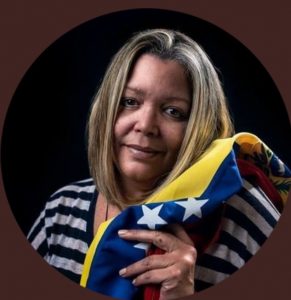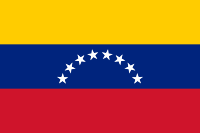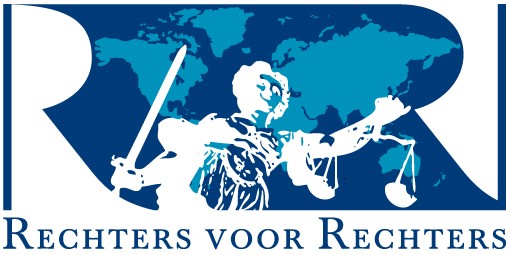 Today ten years ago Venezuelan judge Maria Afiuni was arrested and detained on allegations of taking bribes for granting conditional release. Despite international condemnation, her prison sentence was upheld on appeal this fall. On this sad occasion, Judges for Judges calls attention to her case. Continue reading Ten years ago today: detention of Venezuelan judge Maria Afiuni
Today ten years ago Venezuelan judge Maria Afiuni was arrested and detained on allegations of taking bribes for granting conditional release. Despite international condemnation, her prison sentence was upheld on appeal this fall. On this sad occasion, Judges for Judges calls attention to her case. Continue reading Ten years ago today: detention of Venezuelan judge Maria Afiuni
Category Archives: Venezuela
Update on the disciplinary case of Maria Lourdes Afiuni
Carta para la Asamblea Nacional con respecto a la jueza María Afiuni
 1 de Marzo, La Haya, Países Bajos
1 de Marzo, La Haya, Países Bajos
Estimados miembros de la Asamblea Nacional de República Bolivariana de Venezuela,
Somos la Fundación neerlandesa Jueces para Jueces que opera desde Países Bajos. Es una Fundación que se esfuerza por sus colegas jueces en el extranjero que se encuentran en dificultades o que amenazan con meterse en problemas por el ejercicio de su profesión. Esto puede ser el caso por ejemplo porque se viola o se amenaza su independencia o porque se ejerce presión sobre ellos. La fundación se creó en 1999. Desde 2010 la fundación ha estado involucrada activamente en las situaciones de sus colegas jueces y vigila de cerca la situación en un número de países. Si la fundación se percata de que un juez tiene problemas o corre el riesgo de tener problemas, nos ponemos en contacto con él o ella. También ocurre que los mismos jueces se ponen en contacto con la Fundación. De acuerdo con el juez implicado, se considera qué acción de la Fundación pueda contribuir a mejorar su situación. En un número de casos la Fundación se pone en contacto con las autoridades del país implicado, con los órganos parlamentarios nacionales o europeos o busca la colaboración con las autoridades holandesas o internacionales. En un número de casos buscamos publicidad, en otros casos practicamos la diplomacia silenciosa.
Continue reading Carta para la Asamblea Nacional con respecto a la jueza María Afiuni
Venezuela
‘Nobody wants to be the next Afiuni’
“The Afiuni case has created an atmosphere of fear amongst judges, known as the ‘Afiuni effect’. Prior to the case, the IBAHRI found that Venezuelan judges were fearful of disciplinary proceedings or dismissal if they returned decisions unpopular with the executive.
As a result of the Afiuni case, in particular the multiple violations of the Covenant that have occurred throughout the process and the above-mentioned statement that her case should be considered exemplary, Venezuelan judges are now fearful of criminal proceedings and/or losing their liberty. This has caused significant damage to judicial independence in the country and as reported by the IBAHRI following its 2011 visit to Caracas, ‘Nobody wants to be the next Afiuni’.”
Meanwhile, more than five years have passed since Maria Afiuni was arrested for lifting the provisional detention of a suspect who was considered by the then President Chavez as an enemy of the state. Continue reading Venezuela
Venezuela – El caso Afiuni
‘Nobody wants to be the next Afiuni’
“The Afiuni case has created an atmosphere of fear amongst judges, known as the ‘Afiuni effect’. Prior to the case, the IBAHRI found that Venezuelan judges were fearful of disciplinary proceedings or dismissal if they returned decisions unpopular with the executive.As a result of the Afiuni case, in particular the multiple violations of the Covenant that have occurred throughout the process and the above-mentioned statement that her case should be considered exemplary, Venezuelan judges are now fearful of criminal proceedings and/or losing their liberty. This has caused significant damage to judicial independence in the country and as reported by the IBAHRI following its 2011 visit to Caracas, ‘Nobody wants to be the next Afiuni’.”
Mientras tanto han [pasado más de cinco años] desde que Maria Afiuni fue detenida por otorgar la libertad condicional de un detenido que era considerado un enemigo del estado por el entonces presidente Chávez. Continue reading Venezuela – El caso Afiuni
Venezuela – The Afiuni Case
 ‘Nobody wants to be the next Afiuni’
‘Nobody wants to be the next Afiuni’
“The Afiuni case has created an atmosphere of fear amongst judges, known as the ‘Afiuni effect’. Prior to the case, the IBAHRI found that Venezuelan judges were fearful of disciplinary proceedings or dismissal if they returned decisions unpopular with the executive.
As a result of the Afiuni case, in particular the multiple violations of the Covenant that have occurred throughout the process and the above-mentioned statement that her case should be considered exemplary, Venezuelan judges are now fearful of criminal proceedings and/or losing their liberty. This has caused significant damage to judicial independence in the country and as reported by the IBAHRI following its 2011 visit to Caracas, ‘Nobody wants to be the next Afiuni’.”
Ondertussen is meer dan vijf jaar verstreken sinds Maria Afiuni werd gearresteerd wegens het opheffen van de voorlopige hechtenis van een verdachte die door toenmalig president Chavez als vijand van de staat werd beschouwd.
De strafzaak tegen Afiuni Continue reading Venezuela – The Afiuni Case
Over solidariteit en de persoonlijke moed van daadwerkelijk onafhankelijke en onpartijdige rechters
De onafhankelijkheid en onpartijdigheid van de rechter: holle frase of dagelijks richtsnoer? In deze bijdrage schrijft de voorzitter van Rechters voor Rechters waarom de Stichting zich inzet voor dappere rechters als de Venezolaanse María Lourdes Afiuni, de Servische Dragana Boljević en de Oekraïense Oleksandr Volkov.
Een onafhankelijke rechterlijke macht in een land kan alleen bestaan bij de gratie van individuele rechters die de durf en persoonlijke moed hebben om ook in zware tijden een rechte rug te houden en de ruimte te bevechten om in onpartijdigheid recht te doen zonder aanzien des persoons. En dat is voor deze rechters dan geen holle frase maar een dagelijks richtsnoer. Dit zijn mensen die op de momenten dat het erop aankomt, daadwerkelijk bereid zijn om de consequenties te aanvaarden die horen bij een integere invulling van het rechtersambt.
Artikel in Ars Aequi door Tamara Trotman. (PDF) / ArsAequi.nl
Statement on judiciary in Russian Federation, and individual case of Judge María Lourdes Afiuni in Venezuela | CIJL

Statement on judiciary in Russian Federation, and individual cases in Venezuela and Swaziland
The ICJ today made an oral statement at the UN Human Rights Council, in the interactive dialogue with the Special Rapporteur on the independence of judges and lawyers, responding to her report on her visit to the Russian Federation.
The statement also highlighted the case of reprisals against judge Maria Lourdes Afiuni from Venezuela, and the arbitrary detention and unfair trial of human rights lawyer Thulani Maseko and journalist Bheki Makhubu in Swaziland.
The statement affirmed that although some progress has been made in legal and institutional reforms to develop an independent and impartial judiciary in Russia, advances remain extremely fragile and are threatened by retrogressive legislative measures, by corruption and by undue influence.
The greatest obstacle is a pervasive mind-set amongst judges who see themselves as executive officials rather than as exercising an autonomous judicial role.
The statement discussed improper influence in selection, appointments and removals of judges in Russia.
It also stressed concerns around the merger of the Supreme Court and High Arbitration Court into a new unified Supreme Court for the Russian Federation.
The ICJ also highlighted the case of Judge María Lourdes Afiuni from Venzuela, emblematic of a wider crisis for the rule of law in Venezuela.
After a lengthy period of arbitrary detention in which she was subjected to gross abuses, she remains enmeshed in a seemingly endless criminal procedure.
She was targeted solely for having duly performed her functions as a judge, after she ended a detention that had been recognised as arbitrary by the Working Group on Arbitrary Detention.
The statement also thanked the Special Rapporteur for her press release, issued jointly with three other special procedures on 12 June, about human rights lawyer Thulani Maseko and journalist Bheki Makhubu, who are under arbitrary detention and unfair trial in Swaziland.
The representatives of Venezuela interrupted the ICJ statement, invoking a point of order.
In her closing comments, the Special Rapporteur reiterated her concerns about the case of Judge Afiuni, calling once again for all charges against her to be dropped and for her to be reinstated.
The ICJ June 2014 report on the rule of law in Venezuela is available here.
A 2012 ICJ report on disciplinary procedures applicable to judges in Russia is available here.
- ICJ-HRC26-Statement judiciary Russia-advocacy-non legal submission-2014 (full text in pdf)
Source: 16.06.2014. http://www.icj.org/?p=29677. Republished with permission.
Venezuela: weak legal system threatens democracy and human rights; reforms urgently needed, new report says | CIJL
 A new report launched today by the ICJ pinpoints key deficiencies in the Venezuelan legal system, which threaten the rule of law, democracy and human rights in the country.
A new report launched today by the ICJ pinpoints key deficiencies in the Venezuelan legal system, which threaten the rule of law, democracy and human rights in the country.
The report Strengthening the Rule of Law in Venezuela documents failures by the authorities, as well as interference, intimidation, arbitrary suspensions and other pressures, that have undermined the independence and impartiality of the country’s judges and prosecutors, and the ability of lawyers to be effective and independent in upholding people’s rights.
The study calls for reform to the legal institutions and practices in the country, with the prime objective to restore their independence.
“The situation in Venezuela underscores the need for reforms and demonstrates exactly why a robustly independent judiciary Continue reading Venezuela: weak legal system threatens democracy and human rights; reforms urgently needed, new report says | CIJL
Urgent need for Venezuelan justice system reform highlighted by trial of Judge Afiuni states new IBAHRI report
A new report states the Venezuelan justice system does not contain adequate systemic safeguards to guarantee judicial independence and cites the trial of Judge María Lourdes Afiuni as emblematic of the situation in general. Describing her trial as being characterised by multiple violations of due process and other human rights, the International Bar Association’s Human Rights Institute (IBAHRI) points to an urgent need for reform of the Venezuelan judiciary.
The 28-page IBAHRI trial observation report, entitled The Execution of Justice: The criminal trial of Judge María Lourdes Afiuni, details a number of specific irregularities in the trial of Judge Afiuni, including:
- her being arrested without a warrant and the late President of Venezuela Hugo Chavez Frías appearing on national television immediately afterwards calling for her imprisonment;
- her being subjected to grievous physical abuse in the female maximum security prison Instituto Nacional de Orientación Femenina between December 2009 and February 2011, amounting to violations of her right to life, liberty, personal integrity and adequate conditions of detention;
- the failure of the public prosecutor to produce sufficient evidence at any stage of the trial in order to substantiate the allegations against her; and
- the frequent procedural delays resulting in a criminal process that has been drawn out over four years, violating Judge Afiuni’s right to a fair trial within a reasonable time.
IBAHRI Co-Chair Sternford Moyo commented,
[ continue reading: http://ibanet.org ]
